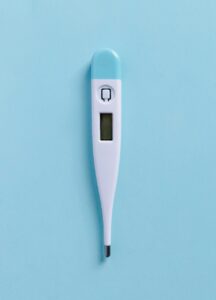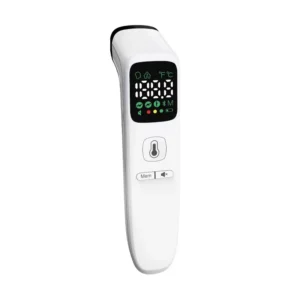What Is a Traditional Thermometer?
Pros of Traditional Thermometers:
- Affordable: Traditional thermometers are often more budget friendly.
- Widely Available: You can find them in most pharmacies and general stores.
- Proven Accuracy: When used correctly, traditional thermometers provide reliable results.
Cons of Traditional Thermometers:
- Time-Consuming: Measurements often take longer, usually 1-2 minutes.
- Hygiene Concerns: Sharing thermometers can lead to cross-contamination without proper sterilization.
- Uncomfortable for Kids: Young children may resist oral or rectal temperature checks, making the process difficult.
- Fragility: Glass mercury thermometers are prone to breakage, which can pose health risks.
What Is an Infrared Thermometer?
Pros of Infrared Thermometers:
- Fast Results: Provides readings in seconds, saving time, especially in emergencies.
- Contactless: Eliminates the risk of cross-contamination, making it highly hygienic.
- Kid-Friendly: A non-invasive solution that’s perfect for fussy or sleeping children.
- Versatile: Can also be used to measure the temperature of objects, liquids, or room environments.
- Advanced Features: Many models include memory storage for previous readings and audible alerts for fever detection.
Cons of Infrared Thermometers:
- Higher Cost: Infrared thermometers are generally more expensive than traditional options.
- Battery Dependency: Requires batteries to function, which may need frequent replacement.
- Learning Curve: Proper usage is essential to ensure accurate results, such as maintaining the right distance during measurements.
Key Comparison: Traditional vs. Infrared Thermometers
| Feature | Traditional Thermometer | Infrared Thermometer |
|---|---|---|
| Accuracy | High (when used correctly) | High (with proper technique) |
| Speed | 1-2 minutes | Instant (1-2 seconds) |
| Hygiene | Requires cleaning between uses | Completely contactless |
| Ease of Use | May require cooperation from the patient | Quick and non-invasive |
| Cost | Low | Moderate to High |
| Durability | Fragile (for glass thermometers) | Durable |
| Versatility | Limited to body temperature | Can measure objects and environments |
Why Choose the Berflow Contactless Digital Thermometer?
The Berflow Contactless Digital Thermometer combines the latest infrared technology with user-friendly features, making it a standout choice for modern families. Here’s why it’s worth considering:
- Hygienic and Safe: The contactless design ensures safe use for everyone in your household, minimizing the spread of germs.
- Fast and Accurate: Get precise readings in just one second, even for squirmy kids or sleeping babies.
- Multifunctional: Use it to measure body temperature, baby formula, bathwater, and even room temperature.
- Easy to Use: Intuitive controls and a sleek design make it suitable for all age groups.
- Peace of Mind: With memory storage and fever alarms, it simplifies health monitoring during stressful times.
Final Thoughts
Both traditional and infrared thermometers have their advantages, but your choice ultimately depends on your needs. If you prioritize affordability and familiarity, a traditional thermometer might work for you. However, if you value convenience, hygiene, and versatility, an infrared thermometer like the Berflow Contactless Digital Thermometer is the clear winner.
Don’t wait for the next fever scare—equip your home with the best. Visit our Berflow Shop to learn more and order today!



